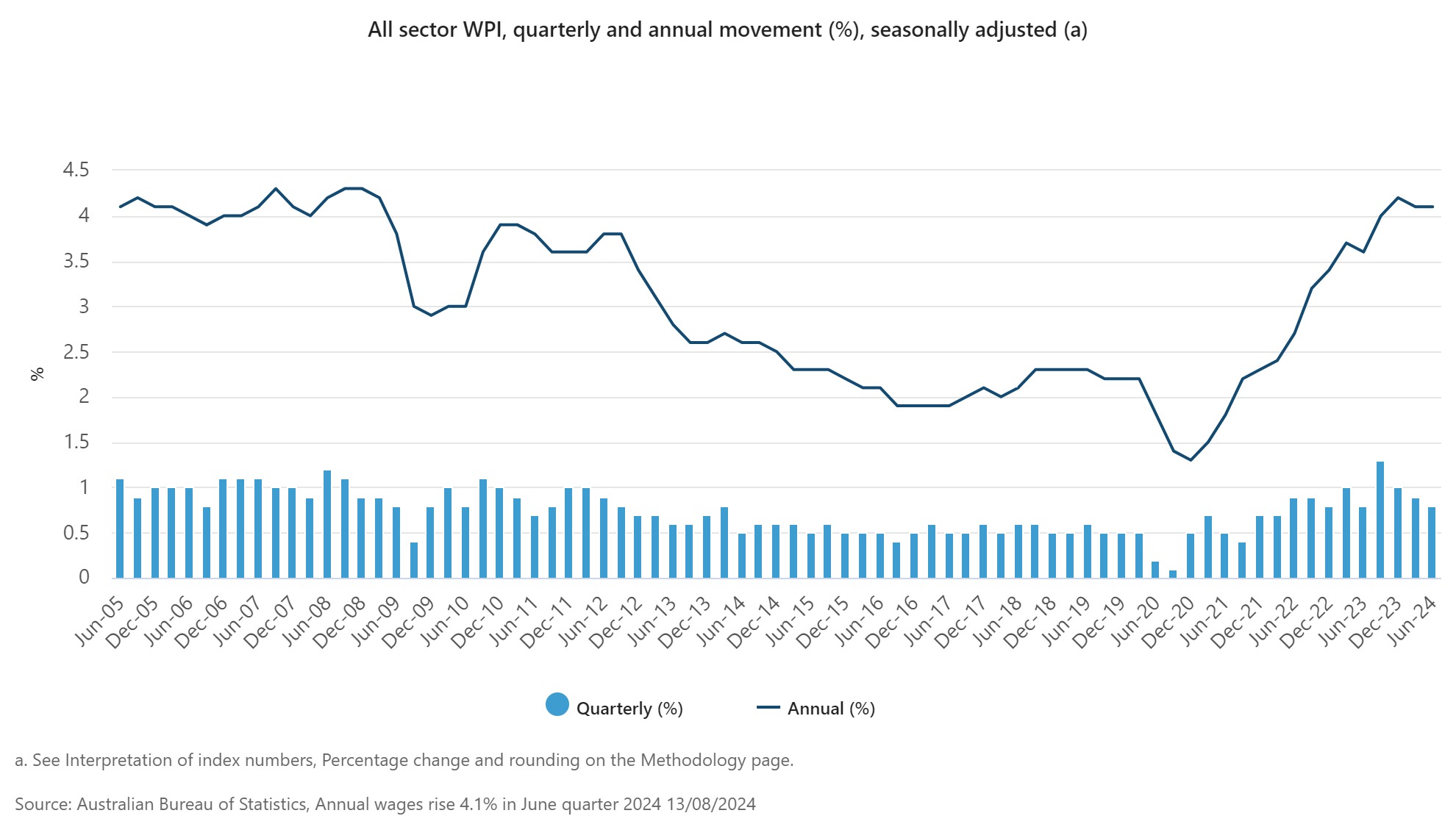Why financial knowledge creates false prophets

Whereas the official ABS knowledge confirmed the Wage Worth Index (WPI) rose 0.8% in June quarter 2024, and 4.1% for the yr, the fact on the bottom is perhaps over double that, in line with payroll platform Employment Hero.
Employment Hero’s Month-to-month employment report discovered quarterly median wage development was really up 2.0% and eight.8% over the yr, which in line with the corporate’s CEO and chief economist Ben Thompson, confirmed “wageflation is getting worse”.
“It’s placing excessive strain on Australian small companies,” mentioned Thompson (pictured above left).
Thompson mentioned there’s a present lack of real-time transparency within the employment market and what somebody is price right now shouldn’t be essentially what they had been price yesterday.
“Because it stands, the info that employers and job seekers have entry to is both outdated, unverified or not revealing the entire employment image,” he mentioned.
“That is very true with wage knowledge. Due to this the market is negotiating blindly.”
What the ABS wage development knowledge says
Over the June quarter, non-public sector wages grew by 0.7%, down from 0.9% within the March quarter 2024, in line with the ABS knowledge launched on Tuesday, the bottom quarterly rise since December 2021.
Annual wage development within the non-public sector was 4.1% in June quarter 2024, following three consecutive quarters at 4.2 % and better than the three.9 % development recorded this time final yr.
Then again, public sector wages rose 0.9%, up from 0.6% within the March quarter 2024.
Michelle Marquardt (pictured above centre), ABS head of costs statistics, mentioned this was partly as a result of all Australian Public Service workers obtained pay will increase efficient March 14.
“This led to a bigger improve within the contribution Commonwealth jobs made to public sector wage development. Pay rises for these jobs had beforehand been paid at completely different instances throughout quarters relying on the timing of particular person company agreements,” she mentioned.

A separate NAB survey confirmed enterprise situations (which measure gross sales, employment and profitability) rose to 6 factors in July 2024 to be solely barely under their long-run common. Confidence declined two factors to at least one with falls throughout industries besides building and recreation.
Tim Keith (pictured above proper), managing director of Cap House, a personal credit score funding supervisor and non-bank lender, mentioned each units of knowledge spotlight the nice balancing act the central financial institution has in setting rates of interest subsequent month.
“Whereas the Reserve Financial institution of Australia (RBA) stored rates of interest on maintain in August, there may be nonetheless an opportunity that it might increase rates of interest in September, given inflation stays sticky, wages development remains to be comparatively excessive regardless of some cooling within the non-public sector, and enterprise situations within the financial system stay sturdy,” he mentioned.
“If the RBA does increase rates of interest once more, that will be beneficial for returns on non-public credit score funds, that are usually floating fee and linked to market rates of interest.”
Whereas it’s tough to say how this knowledge will influence the RBA’s decision-making, analysts have made their predictions.
What the SmartWatch employment knowledge says
With the significance of the RBA’s determination in thoughts, Employment Hero’s newest SmartMatch Employment Report paints a distinct image.
From the July figures, the state with the best wage development year-on-year is NSW (9.9%) and the state with the bottom is SA (6.7%).
State breakdowns
|
State
|
Median Hourly Price
|
Month-on-Month change
|
12 months-on-12 months change
|
|---|---|---|---|
|
ACT
|
$43.90
|
-0.1%
|
9.1%
|
|
NSW
|
$44.30
|
2.9%
|
9.9%
|
|
NT
|
$40.60
|
1.5%
|
9.4%
|
|
QLD
|
$41.80
|
3.1%
|
9.4%
|
|
SA
|
$40.0
|
3.5%
|
6.7%
|
|
TAS
|
$36.60
|
1.7%
|
7.3%
|
|
VIC
|
$41.80
|
1.8%
|
8.3%
|
|
WA
|
$41.0
|
1.8%
|
7.6%
|
At an trade degree, Development and Commerce companies noticed the best year-on-year wage development at 18.0%, adopted by Consulting and Technique at 14.0% and Actual Property and Property at 13.2%.
Among the many lowest wage development had been industries comparable to Sport and Recreation (1.7%), Science and Know-how (2.8%), and Design and Structure (3.7%).
Full-time staff noticed the best year-on-year wage development with 9.6%, part-time staff at 6.0% and casuals at 5.9%.
These aged 45-55 command the best hourly wage at $50.60 and noticed their wages improve by 12.0% year-on-year. These aged 14-17 noticed the weakest year-on-year development at 5.0%.
|
Age
|
Median Hourly Price
|
Month-on-Month change
|
12 months-on-12 months change
|
|---|---|---|---|
|
14-17
|
$19.10
|
0.2%
|
5.0%
|
|
18-24
|
$34.20
|
2.1%
|
5.8%
|
|
25-44
|
$45.40
|
2.5%
|
8.6%
|
|
45-54
|
$50.60
|
2.0%
|
12.0%
|
|
55+
|
$44.40
|
2.0%
|
9.1%
|
Thompson mentioned the “ongoing wageflation” that Employment Hero’s 8.8% wage improve revealed was “an necessary metric that have to be thought-about by determination makers”, particularly when considered within the context of the RBA’s ongoing battle towards inflation.
“The impacts of probably unsustainable wage development should even be weighed towards ASIC’s findings that enterprise failure charges are nearing recession ranges,” Thompson mentioned.
“By way of this month’s wage leap, we suspect it might mirror the rise in minimal wages and awards that got here into impact on July 1.”
How the SmartMatch Employment Report differs from ABS knowledge
The median hourly wage knowledge included within the month-to-month SmartMatch Employment Report differs from what’s reported on by the ABS in plenty of methods.
For instance, the ABS’ Wage Worth Index, which is issued quarterly, is predicated on a pattern of 18,000 jobs drawn from 3,000 non-public and public sector companies, in line with Thompson.
Survey invites are despatched to companies of all sizes, with each enterprise given an equal alternative to take part.
As compared, Thompson mentioned the SmartMatch wage knowledge is drawn instantly from the 300,000 enterprise and over 2 million workers on the Employment Hero platform globally and is knowledgeable by real-time payroll knowledge.
“The SmartMatch Employment Report can be issued month-to-month to present the trade an on-going and updated snapshot of employment in Australia,” he mentioned.
Moreover, whereas the ABS focuses on base pay, Employment Hero’s wage knowledge analyses the complete compensation bundle which incorporates base pay, bonuses, commissions and different kinds or remuneration.
“This supplies an alternate image of earnings and provides employers and job seekers a priceless useful resource for making employment choices.”
Additional info on the methodology behind Employment Hero’s SmartMatch Employment Report and extra metrics may be discovered right here.
Studying tea leaves: The place are the false prophets now?
The contrasting figures from ABS and Employment Hero underscore the challenges in measuring and forecasting completely different facets of the Australian financial system.
Whereas the ABS supplies the authoritative benchmark, Employment Hero’s real-time knowledge gives a distinct perspective that highlights potential disparities in wage development.
This divergence in knowledge highlights the complicated problem for the Reserve Financial institution of Australia (RBA) because it navigates its financial coverage choices.
The RBA should sift by varied financial indicators, every doubtlessly pointing in numerous instructions, to find out essentially the most applicable plan of action.
As RBA deputy governor Andrew Hauser famous in a latest speech, predicting the exact path of financial coverage is fraught with uncertainty.
“It’s proper to need to be assured that the central financial institution will carry inflation again to focus on and keep full employment: that’s the RBA’s mandate and we needs to be held to account for it,” Hauser mentioned to the Financial Society of Australia in Brisbane on Monday.
“However the coverage technique required to ship that final result, and the financial judgments that inform it, merely can’t be said with something like the identical diploma of certainty. These pretending in any other case are false prophets.”
On this context, the disparity between ABS and Employment Hero’s knowledge emphasises the necessity for a nuanced understanding of wage developments and their implications for broader financial coverage.
As companies, workers, and policymakers seek for that means among the many financial tea leaves, the problem stays to steadiness real-time knowledge with official metrics to craft a path ahead.
Associated Tales
Sustain with the newest information and occasions
Be part of our mailing checklist, it’s free!


